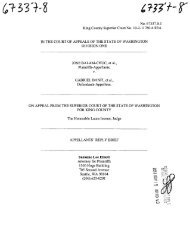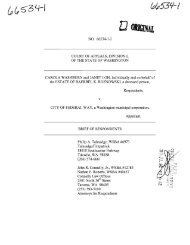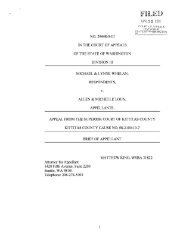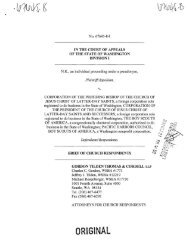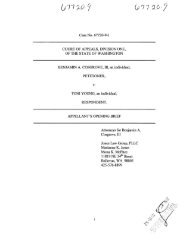Washington State Courts
Washington State Courts
Washington State Courts
Create successful ePaper yourself
Turn your PDF publications into a flip-book with our unique Google optimized e-Paper software.
3 B.-H.'s consent to search was not voluntary.<br />
Even if this Court decides the seizure was lawful, B.-H. did not<br />
voluntarily consent to Johnson's search. Like the investigative detention<br />
discussed above, consent is a narrowly drawn exception to the warrant<br />
requirement. <strong>State</strong> v. Morse, 156 Wn.2d 1, 15, 123 P.3d 832 (2005). The<br />
state has the burden of showing consent is voluntary by clear and<br />
convincing evidence. <strong>State</strong> v. Smith, 115 Wn.2d 775, 789, 801P.2d 975<br />
(1990).<br />
The test is whether under the totality of the circumstances, consent<br />
was the product of duress or coercion, express or implied. Schneckloth v.<br />
Bustamonte, 412 U.S. 218,227,93 S. Ct. 2041,36 L. Ed. 2d 854 (1973);<br />
<strong>State</strong> v. O'Neill, 148 Wn.2d 564, 588, 62 P.3d 489 (2003). Coercion may<br />
be "by explicit or implicit means, by implied threat or covert force" or it<br />
may be subtle. Schneckloth, 412 U.S. at 228. In examining the<br />
surrounding circumstances to determine if the consent to search was<br />
coerced, account must be taken of subtly coercive police questions, as well<br />
as the possibly vulnerable subjective state of the person who consents. Id.,<br />
at 229.<br />
-19-



